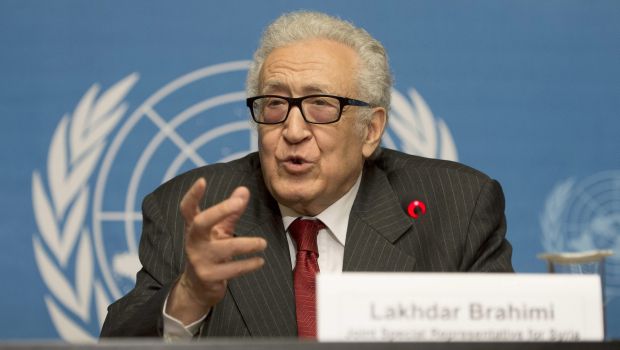
UN Joint Special Representative for Syria Lakhdar Brahimi delivers a press conference at the European headquarters of the United Nations, in Geneva, Switzerland, on November 5, 2013. (EPA/JEAN-CHRISTOPHE BOTT)
The joint UN–Arab League envoy to Syria, Lakhdar Brahimi, held meetings on Tuesday with American and Russian diplomats to prepare for the Geneva II peace conference. The meeting failed to secure a date for the summit, raising fears that it will not take place this year.
Brahimi refused to discuss the reasons for the failure of Tuesday’s talks at the news conference, but said “the opposition was divided and not ready,” and that “there should be two delegations from Syria in Geneva, one representing the regime and one the opposition.”
Meanwhile, Najib Al-Ghadban, a representative of the National Coalition of Syrian Revolutionary and Opposition Forces in the United States, told Asharq Al-Awsat that Brahimi “tried to make unfair insinuations” by accusing the opposition of “obstructing the Geneva II conference.” He added that the opposition demanded only the implementation of the measures agreed at the 2012 Geneva conference on Syria, “which has yet to be accepted by the Syrian regime.”
The communiqué issued at the 2012 Geneva conference set out several steps to end the fighting in Syria, including the formation of an interim government with full executive powers composed of figures acceptable to both sides.
Ghadban said: “The other party is the one obstructing the political resolution of the Syrian issue by refusing to relinquish power, when Geneva I stipulated that a transitional governing authority should be formed.” He responded to Brahimi’s comments that the opposition needed to present a credible delegation to the conference by saying, “The Coalition, with all its factions, is representative of the Syrian opposition.”
Ahmad Ramadan, a member of the Coalition and the executive bureau of one of its most prominent components, the Syrian National Council (SNC), told Asharq Al-Awsat that he did not expect the Geneva II conference to be held this year, saying it would be postponed to January 2014 at the earliest.
In a related development, Syrian opposition sources told Asharq Al-Awsat that meetings were held in Geneva on Tuesday between representatives of the United States and Russia, members of the National Coordination Committee, Manaf Tlass, Rifaat Al-Assad, and representatives of the Popular Will for Change and Liberation Party, which is led by former deputy prime minister Qadri Jamil.
Rifaat Al-Assad is the uncle of Syria’s current president, Bashar Al-Assad. A former regime insider, he was exiled after attempting to seize power from his brother, Hafez—Bashar’s father—in the mid-1980s, after achieving international notoriety for commanding the forces that crushed the Muslim Brotherhood uprising in the Syrian city of Hama in 1982.
Tlass, also a former member of Assad’s inner circle, was a brigadier-general in the Syrian army until his defection in July of last year.
Speaking to Asharq Al-Awsat, Ghadban described the invitation of those parties to attend a Geneva II preparatory meeting was “a Russian move to present figures who are part of the regime and who have blood on their hands as opposition figures, which is an attempt to circumvent the principles of the conference.”
Ghadban added that he did not see any benefit to Russia’s invitation to the regime and the opposition to hold talks in Moscow, which came on Wednesday. He said: “Russia is not an impartial party, especially since it is running the political process on behalf of Assad and was the godfather of the chemical weapons deal, when they surrendered the chemical weapons and kept [their conventional weapons].”
Russian deputy foreign minister Mikhail Bogdanov announced on Wednesday Russia’s willingness to hold an unofficial meeting in Moscow between representatives of the Syrian regime and the opposition before Geneva II.
Meanwhile, SNC member Ahmad Ramadan said: “The regime’s refusal to attend the conference means it refuses to recognize the principles of Geneva II, which is reflected by Russian stances that seem to contradict Moscow’s recent agreements with the Americans.”
